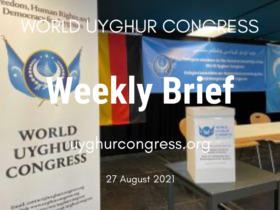WEEKLY BRIEF: 27 AUGUST 2021

NEWS
The World Uyghur Congress Will Convene its 7th General Assembly in November
On August 22, 210 delegates from Uyghur communities in 25 countries were democratically elected. These delegates will convene at the World Uyghur Congress’ (WUC) 7th General Assembly, from 12-14 November in Prague, Czech Republic, to be elected for the WUC’s 16 different committees and board membership, including presidency. During the General Assembly, all sixteen committees of the WUC and its representatives will first report on the organization’s activities from 2017-2021, as well as the financial report of the past four years. Following this, the current board members, including the President, will step down from their positions, and the newly elected delegates will run for board positions and presidency. After the results of the elections have been announced during the General Assembly, the following day(s) will then consist of meetings with the newly elected board and president, in order to plan and strategize on the organization’s priorities and activities for the next three years.
Australian Senate votes to ban forced labor imports
On August 23, the Australian Senate has passed a bill to ban the import of any goods made with forced labor into Australia. The bill was introduced by independent Senator Rex Patrick, and is an important step in international efforts to combat Uyghur forced labour. The bill now moves to the House of Representatives, where it needs support from the government Coalition to pass. The passing of the Customs Amendment (Banning Goods Produced by Forced Labour) Bill 2021 coincides with the 240th anniversary of the International Day for the Remembrance of the Slave Trade and its Abolition. The World Uyghur Congress has welcomed the bill’s passage in the Senate, and urges the Government coalition to vote in favour of the bill in the House of Representatives.
Mahmutjan Memetjan Has Been Confirmed Detained in The Camp
On August 23, Radio Free Asia (RFA) reported that Mahmutjan Memetjan, a leading Uyghur entrepreneur who returned from a visit to the United States in 2016 and vanished without a trace, has been confirmed detained by authorities in an internment camp in East Turkistan. According to RFA, Mahmutjan’s wife is currently living in Urumqi, where she has faced great difficulties since her husband’s detention. Chinese authorities have targeted and arrested numerous Uyghur businessmen, intellectuals, and cultural and religious figures for years as part of a campaign to monitor, control, and assimilate members of Uyghur society.
Interpol Cancels a ‘Red Notice” Arrest Warrant for Idris Hasan
On August 24th, the South China Morning Post reported that Interpol has cancelled a “red notice” arrest warrant for a Uyghur activist amid concerns that Beijing is abusing the international terrorist alerting system to repatriate dissidents to China. Moroccan authorities confirmed on July 27 that Idris Hassan was detained at Casablanca airport while in transit due to an Interpol red notice requested by China. During the first hearing, which took place on August 12, Idris Hassan was represented by three lawyers. Foreign diplomats from several western countries also attended the hearing. Media, local and foreign alike, were barred from entering. China has still not provided the case file, which raises concerns about why the Moroccan prosecutor has initiated the process.
The Biggest Fear for Uyghurs in Afghanistan is to be targeted by China
On August 27 the BBC reported that many Uyghurs living in Afghanistan – thought to number about 2,000 – are terrified that the Taliban’s takeover of the country could mean they will be extradited to China, where they will face harsh punishment or suffer other dangers. They fear that under the promise of political recognition and economic cooperation from China, the Taliban will aid Beijing in forcibly repatriating Uyghurs to East Turkistan. Moreover, unlike some other potentially at-risk groups in Afghanistan, Uyghurs do not have a state ally to work on their behalf – a fact which might make them more vulnerable under Taliban rule.


